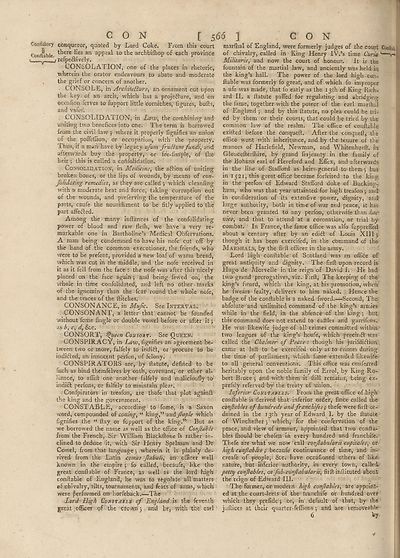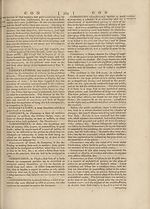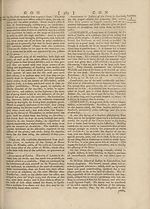Encyclopaedia Britannica, or, a Dictionary of arts, sciences, and miscellaneous literature : enlarged and improved. Illustrated with nearly six hundred engravings > Volume 6, CHI-Crystallization
(612) Page 566
Download files
Complete book:
Individual page:
Thumbnail gallery: Grid view | List view

CON
Confiftory conqueror, quoted by Lord Coke. From this court
Conftable t^lerc ^es an aPp-2al to the archbilhop of each province
> _ 'i refpefiively.
CONSOLATION, one of the places in rhetoric,
wherein the orator endeavours to abate and moderate
the grief or concern of another.
CONSOLE, in At'chite&ure, an ornament cut upon
the key of an arch, which has a proje&ure, and on
occafion ferves to fupport little corniches, figures, bulls,
and vales!
CONSOLIDATION, in Law, the combining and
uniting two benefices into one. The term is borrowed
from the civil law 5 where it properly fignifies an union
of the poffellion, or occupation, with the property.
I hus, if a man have by legacy ufam fruEium fundi, and
afterwards buy the property, or fee-fimple, of the
heir ; this is called a cohfolidation.
Consolidation, in Medicine, the action of uniting
broken bones, or the lips of wounds, by means of con-
fohdating remedies, as they are called } which cleanfing
with a moderate heat and force, taking corruption out
•of the wounds, and preferving the temperature of the
parts, caufe the nourxthment to be fitly applied to the
part affefled.
Among the many inftances of the confolidating
power of blood and raw flelh, We have a very re¬
markable one in Bartholine’s Medical Obfervations.
A man being condemned to have his nofe cut off by
the hand of the common executioner, the friends, who
were to be prefent, provided a new loaf of warm bread,
which was cut in the middle, and the nofe received in
it as it fell from the face : the nofe was after this nicely
placed on the face again ; and being fewed on, the
whole in time 'Confolidated, and left no other marks
•of the ignominy than the fear round the whole nofe,
and the traces of the Hitches.
CONSONANCE, in Mufc. See Interval.
CONSONANT, a letter that cannot be founded
without feme fingle or double vowel before or after it j
as b, c, d, &c.
CONSORT, ^ueen Comsoxt. See Queen.
CONSPIRACY, in L/uo, fignifies an agreement be¬
tween two or more, falfely to indiid, or procure to be
indicted, an innocent perfon, of felony.
CONSPIRATORS are, by ftatute, defined to be
fuch as bind themfelves by oath, covenant, or other al¬
liance, to afiift one another falfely and malicioufly to
indict perfons, or falfely to maintain pleas
Confpirators in treafon, are thofe that plot againft
the king and the government.
CONSTABLE, according to fome, is a Saxon
word, compounded of coning, “ king,” and Jletple which
fignifies the “ flay or fupport of the king.” But as
we borrowed the name as well as the office of Corftable
from the French, Sir William Blackftone fs rather in¬
clined to deduce it, with Sir Henry Spelman and Dr
Cowel, from that language j wherein it is plainly de¬
rived from the Latin comes Jlabuli, an officer well
known in the empire 5 fo called, becaufe, like the-
great ccnflable of France, as well as the lord high
conftable of England, he was to regulate all matters
cf chivalry, tilts, tournaments, and feats of arms, which
were performed on horfeback.—The
Lord High Const ails of England is the feventh
great officer of the crown 3 and he, with the carl
[ 565 ]
CON
marfhal of England, were formerly judges of the court Conftab f
of rhivalrv rnllprl in ICinn- T-TLnru IV ’c tl.-rx. v.n»
of chivalry, called in King Henry IV.’s time Curia
Militaris, and now the court of honour. It is the
fountain of the martial law, and anciently was held in
the king’s hall. The power of the lord high con¬
ftable was formerly fo great, and of which fo improper
a ufe was made; that fo early as the 13 th of King Rich¬
ard II. a ftatute paffed for regulating and abridgina-
the fame, together with the power of the earl msrftuft
of England 3 and by this ftatute, no plea could be tri¬
ed by them or their courts, that could be tried by the
common law of the realm. The office of conftable
cxifted before the conqueft. After the conqueft, the
office went with inheritance, and by the tenure of the
manors of Harlefield, Newman, and Whitenhurft, in
Gloucefterlliire, by grand ferjeanty in the family of
the Bohuns earl of Hereford and Effcx, and afterwards
in the line of Stafford as heirs-general to them 3 but
in 1521, this great office became forfeited to the king
in the perfon of Edward Stafford duke of Bucking¬
ham, who was that year attainted for high treafon; and
in confideration of its extenfive power, dignity, and
large authority, both in time of war and peace, it has
never been granted to any perfon, otherwife than hac
vice, and that to attend at a coronation, or trial by
combat. In France, the fame office was alfo fuppreffed
about a century after by an edift of Louis XIII ;
though it has been exercifed, in the command of the
Marshals-, by the fir ft officer in the army.
Lord high conftable of Scotland was an office of
great antiquity and dignity. The firft upon record is
Hugo de Morvelle in the reign of David I. He had
two grand prerogatives, viz. F;rft, The keeping of the
king’s fwerd, which the king, at his promotion, when
he fwears fealty, delivers to him naked. Hence the
badge of the conftable is a naked fword.—Second, The
abfolute and unlimited command of the king’s armies
while in the field, in the abfence of the king ; but
this command does not extend to cattles and garrifons.
He was likewife judge of all crimes committed within
txvo leagues of the king’s houfe, which preeinfV was
called the Ckalmer of Peace : though his jurifdiftion
came at laft to be exercifed only as to crimes during
the time of parliament, which lome extended likewife
to all general conventions. This office was conferred
heritably upon the noble family of Errol, by King Ro¬
bert Bruce ; and with them it ftill remains, being ex-
pfefsly referved by the treaty of union.
Inferior Constables. From the great office of high
conftable is derived that inferior order, fince called the
conftables of hundreds and franch fes; thefe were fivft or¬
dained in the 13th year of Edward I. by the ftatute
of Winchefter ; which, for the confervation of the
peace, and view of armour, appointed that two ccnfta-
bles fhould be chofen in every hundred and franebile.
Thefe are what we now call conjlabularii capitales, or
high csnfalks; becaufe continuance of time, and in-
creafe of people, &c. have occafioned others of like;
nature, but inferior authority, in every town, called
petty confables, or fub-confabidarii, firft inftituted about
the reign of Edward III.
The former, or modern high confables, are appoint¬
ed at the court-leets of the Iranchife or hundred over
which they prefide; or, in default of that, by the
juftices at their quarter-feffions ; and are removeable
6 Vy
•t
Confiftory conqueror, quoted by Lord Coke. From this court
Conftable t^lerc ^es an aPp-2al to the archbilhop of each province
> _ 'i refpefiively.
CONSOLATION, one of the places in rhetoric,
wherein the orator endeavours to abate and moderate
the grief or concern of another.
CONSOLE, in At'chite&ure, an ornament cut upon
the key of an arch, which has a proje&ure, and on
occafion ferves to fupport little corniches, figures, bulls,
and vales!
CONSOLIDATION, in Law, the combining and
uniting two benefices into one. The term is borrowed
from the civil law 5 where it properly fignifies an union
of the poffellion, or occupation, with the property.
I hus, if a man have by legacy ufam fruEium fundi, and
afterwards buy the property, or fee-fimple, of the
heir ; this is called a cohfolidation.
Consolidation, in Medicine, the action of uniting
broken bones, or the lips of wounds, by means of con-
fohdating remedies, as they are called } which cleanfing
with a moderate heat and force, taking corruption out
•of the wounds, and preferving the temperature of the
parts, caufe the nourxthment to be fitly applied to the
part affefled.
Among the many inftances of the confolidating
power of blood and raw flelh, We have a very re¬
markable one in Bartholine’s Medical Obfervations.
A man being condemned to have his nofe cut off by
the hand of the common executioner, the friends, who
were to be prefent, provided a new loaf of warm bread,
which was cut in the middle, and the nofe received in
it as it fell from the face : the nofe was after this nicely
placed on the face again ; and being fewed on, the
whole in time 'Confolidated, and left no other marks
•of the ignominy than the fear round the whole nofe,
and the traces of the Hitches.
CONSONANCE, in Mufc. See Interval.
CONSONANT, a letter that cannot be founded
without feme fingle or double vowel before or after it j
as b, c, d, &c.
CONSORT, ^ueen Comsoxt. See Queen.
CONSPIRACY, in L/uo, fignifies an agreement be¬
tween two or more, falfely to indiid, or procure to be
indicted, an innocent perfon, of felony.
CONSPIRATORS are, by ftatute, defined to be
fuch as bind themfelves by oath, covenant, or other al¬
liance, to afiift one another falfely and malicioufly to
indict perfons, or falfely to maintain pleas
Confpirators in treafon, are thofe that plot againft
the king and the government.
CONSTABLE, according to fome, is a Saxon
word, compounded of coning, “ king,” and Jletple which
fignifies the “ flay or fupport of the king.” But as
we borrowed the name as well as the office of Corftable
from the French, Sir William Blackftone fs rather in¬
clined to deduce it, with Sir Henry Spelman and Dr
Cowel, from that language j wherein it is plainly de¬
rived from the Latin comes Jlabuli, an officer well
known in the empire 5 fo called, becaufe, like the-
great ccnflable of France, as well as the lord high
conftable of England, he was to regulate all matters
cf chivalry, tilts, tournaments, and feats of arms, which
were performed on horfeback.—The
Lord High Const ails of England is the feventh
great officer of the crown 3 and he, with the carl
[ 565 ]
CON
marfhal of England, were formerly judges of the court Conftab f
of rhivalrv rnllprl in ICinn- T-TLnru IV ’c tl.-rx. v.n»
of chivalry, called in King Henry IV.’s time Curia
Militaris, and now the court of honour. It is the
fountain of the martial law, and anciently was held in
the king’s hall. The power of the lord high con¬
ftable was formerly fo great, and of which fo improper
a ufe was made; that fo early as the 13 th of King Rich¬
ard II. a ftatute paffed for regulating and abridgina-
the fame, together with the power of the earl msrftuft
of England 3 and by this ftatute, no plea could be tri¬
ed by them or their courts, that could be tried by the
common law of the realm. The office of conftable
cxifted before the conqueft. After the conqueft, the
office went with inheritance, and by the tenure of the
manors of Harlefield, Newman, and Whitenhurft, in
Gloucefterlliire, by grand ferjeanty in the family of
the Bohuns earl of Hereford and Effcx, and afterwards
in the line of Stafford as heirs-general to them 3 but
in 1521, this great office became forfeited to the king
in the perfon of Edward Stafford duke of Bucking¬
ham, who was that year attainted for high treafon; and
in confideration of its extenfive power, dignity, and
large authority, both in time of war and peace, it has
never been granted to any perfon, otherwife than hac
vice, and that to attend at a coronation, or trial by
combat. In France, the fame office was alfo fuppreffed
about a century after by an edift of Louis XIII ;
though it has been exercifed, in the command of the
Marshals-, by the fir ft officer in the army.
Lord high conftable of Scotland was an office of
great antiquity and dignity. The firft upon record is
Hugo de Morvelle in the reign of David I. He had
two grand prerogatives, viz. F;rft, The keeping of the
king’s fwerd, which the king, at his promotion, when
he fwears fealty, delivers to him naked. Hence the
badge of the conftable is a naked fword.—Second, The
abfolute and unlimited command of the king’s armies
while in the field, in the abfence of the king ; but
this command does not extend to cattles and garrifons.
He was likewife judge of all crimes committed within
txvo leagues of the king’s houfe, which preeinfV was
called the Ckalmer of Peace : though his jurifdiftion
came at laft to be exercifed only as to crimes during
the time of parliament, which lome extended likewife
to all general conventions. This office was conferred
heritably upon the noble family of Errol, by King Ro¬
bert Bruce ; and with them it ftill remains, being ex-
pfefsly referved by the treaty of union.
Inferior Constables. From the great office of high
conftable is derived that inferior order, fince called the
conftables of hundreds and franch fes; thefe were fivft or¬
dained in the 13th year of Edward I. by the ftatute
of Winchefter ; which, for the confervation of the
peace, and view of armour, appointed that two ccnfta-
bles fhould be chofen in every hundred and franebile.
Thefe are what we now call conjlabularii capitales, or
high csnfalks; becaufe continuance of time, and in-
creafe of people, &c. have occafioned others of like;
nature, but inferior authority, in every town, called
petty confables, or fub-confabidarii, firft inftituted about
the reign of Edward III.
The former, or modern high confables, are appoint¬
ed at the court-leets of the Iranchife or hundred over
which they prefide; or, in default of that, by the
juftices at their quarter-feffions ; and are removeable
6 Vy
•t
Set display mode to:
![]() Universal Viewer |
Universal Viewer | ![]() Mirador |
Large image | Transcription
Mirador |
Large image | Transcription
Images and transcriptions on this page, including medium image downloads, may be used under the Creative Commons Attribution 4.0 International Licence unless otherwise stated. ![]()
| Permanent URL | https://digital.nls.uk/193015379 |
|---|
| Attribution and copyright: |
|
|---|
| Description | Ten editions of 'Encyclopaedia Britannica', issued from 1768-1903, in 231 volumes. Originally issued in 100 weekly parts (3 volumes) between 1768 and 1771 by publishers: Colin Macfarquhar and Andrew Bell (Edinburgh); editor: William Smellie: engraver: Andrew Bell. Expanded editions in the 19th century featured more volumes and contributions from leading experts in their fields. Managed and published in Edinburgh up to the 9th edition (25 volumes, from 1875-1889); the 10th edition (1902-1903) re-issued the 9th edition, with 11 supplementary volumes. |
|---|---|
| Additional NLS resources: |
|

